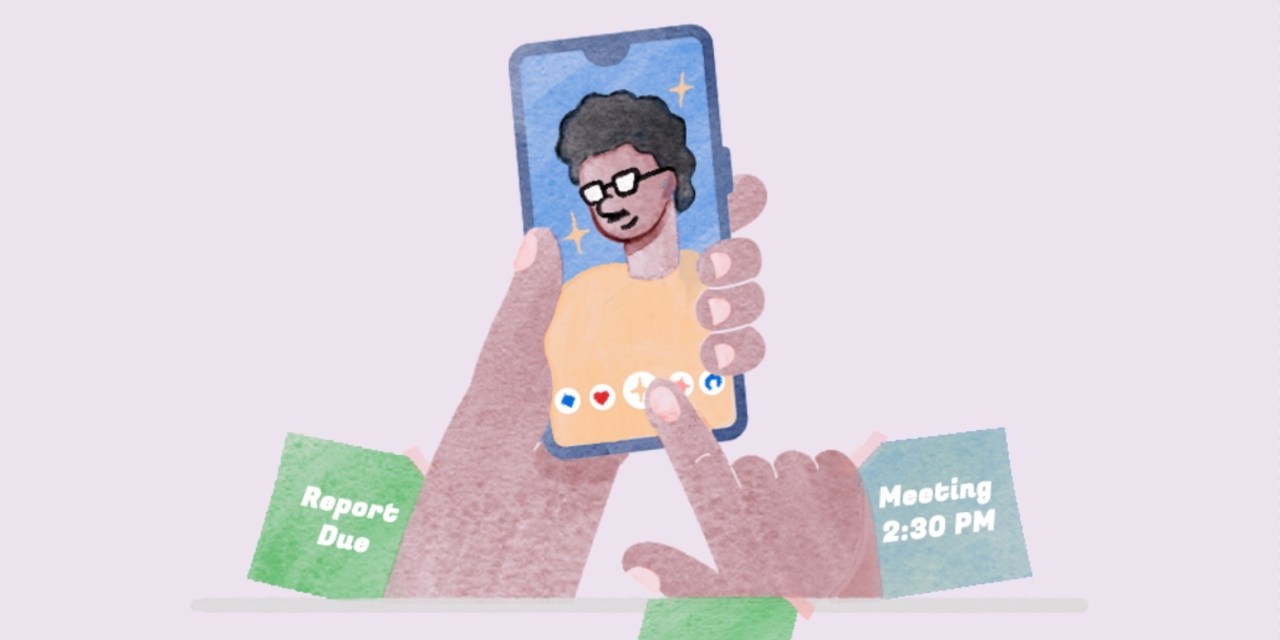How much does cell phone use zap workplace productivity?

Cell phones are ever-present in the modern workplace and an essential tool for many to do their jobs in remote and hybrid environments. But they can also serve as a major distraction and zap productivity — for instance when returning a client’s text turns into falling down an hour-long TikTok-watching rabbit hole. Employers are just beginning to recognize the issue but workers struggling to focus are using their own tactics to use their phones more meaningfully on the job and ensure they’re staying on task.
Some are using apps to monitor and better manage their screen time. BePresent is one example, which Gen Z founder Jack Winston developed after coming to terms with his own phone addiction a year ago. He lost his phone for a weekend and said it was transformational, allowing him to truly be present in the moment and form stronger connections with his friends.
“I just didn’t feel like I was overstimulated and constantly bumping from one thing to the next,” Winston said. The app has game-like settings where users set goals for limiting screen time and can temporarily limit access to certain apps, essentially incentivizing them to not doom scroll.
While it doesn’t yet work with any employers, many BePresent users can limit distractions and boost their productivity during the workday, by using the app. “We’ve been talking with HR professionals and there’s definitely demand and they’re thinking about this problem,” Winston added.
“Everyone is trying to figure out how we live and coexist with these technologies that we need to use. But also they’re commingled with so many things that are detrimental to our health and productivity,” he said.
And this isn’t just a Gen Z problem. Those like Michael Schmied, a senior financial analyst of Kredite Schweiz, witnessed the way smartphones revolutionized the way we work, he said, and managing the barrage of notifications while maintaining focus on work-related tasks is a real challenge for him, “given that I didn’t grow up in the digital age and am still adapting to these changes.”
He’s come up with some practices that help though, like time-blocking or designating specific hours of the day for checking emails and social media. He also uses do-not-disturb settings, which mute cell phone notifications temporarily. He keeps his phone on do-not-disturb during work hours, “This way, I’m not tempted to look at my phone every time it buzzes,” he said.
Organizing his apps based on work versus personal use has also proved helpful. He keeps work-related apps in one folder and social media apps separated in another. “They might not completely eliminate distractions, but they certainly make them more manageable,” he said.
When checking social media is your job
It’s not so easy to manage for others in roles where being “chronically online” is necessary — like those working in social media.
Social media bans or screen-time detoxes simply aren’t feasible for Shauna Madden, social and paid media director at ilk Agency. The nature of her job means being constantly tuned in to trends and conversations on social media, and missing out could seriously harm her ability to get her job done, she said.
“There have been plenty of times when I’ve felt like logging out for a mental well-being break, only to end up back at square one after being pulled back in whilst doing social listening for a client,” she said. “There’s such a huge fear of missing out, because what if you miss that reactive opportunity for that client? What if a competitor brand gets there first?”
Doom scrolling leading to lost productivity also isn’t the biggest concern for her, but rather the impact it has on her mental health.
“There’s a lot of proof that quitting social channels can be good for your mental well-being, productivity and overall work-life balance, but how can you do that when understanding the channel is essential to your work?” Madden said.
After working in the industry for 10 years, she’s learned quite a bit about balancing her work and cell phone use, like setting your own strong boundaries and spotting markers for problem behavior early, she said. She completely bans her own cell phone use daily at mealtimes, during certain hours before bed, whenever she’s out with friends, or when she walks her dog.
“Working in social at least gives you the insight into just how genuinely addictive these apps are. You can at least unpack the algorithms to see how they’re made specifically to keep you scrolling and scrolling, which can be helpful in being strong with yourself and having your own rules for off-work time,” she said.

